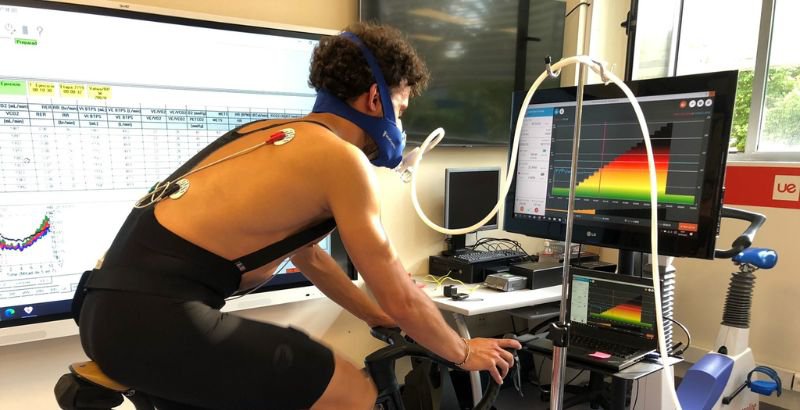Se han llevado a cabo pruebas de composición corporal mediante DEXA, pruebas de ecografía muscular, diferentes test de esfuerzo midiendo el consumo de gases, y pruebas de valoración de la condición de la fuerza, entre otras.

La Facultad de Ciencias del Deporte y Fisioterapia de Universidad Europea (UE) y la Facultad de Ciencias del Deporte de la Universidad de Murcia (UMU) han establecido un acuerdo de colaboración para desarrollar un proyecto de investigación a dos nodos vinculado con el entrenamiento de fuerza y el ciclismo.
En una primera fase del proyecto desarrollada en Murcia el equipo del Decano de Facultad e Investigador Principal del grupo de HP Sports Science, Jesús García Pallarés se planificaron cuáles serían las técnicas, materiales, métodos y pruebas más adecuadas para intentar dar respuesta a la pregunta que nos estamos planteando: ¿una nueva metodología de trabajo de fuerza sobre la bicicleta podría ser igual de efectiva que el entrenamiento clásico de fuerza en sala de musculación?
Una vez realizado este diseño experimental, desde hace más de un año, se vienen recogiendo y analizando datos de diferentes ciclistas que pasan por los laboratorios de ambas Facultades. El compartir la gran parte de los equipamientos y el entusiasmo y ganas mostrado por los participantes y los investigadores implicados, está haciendo que la toma de datos vaya a buen ritmo, sin olvidar que queda seguramente más de un año de duro trabajo para poder completar los objetivos planteados al principio de la investigación.
De forma más concreta del 14 al 18 de septiembre del 2022 se ha iniciado una nueva fase de toma de datos en las instalaciones de los laboratorios de la Universidad Europea, cinco días de intenso trabajo en el que un número importante de investigadores de ambas Facultades han trabajado de forma conjunta y coordinada para desarrollar este ambicioso proyecto, cuyo investigador principal es el Dr. David Barranco.
Se han llevado a cabo pruebas de composición corporal mediante DEXA, pruebas de ecografía muscular, diferentes test de esfuerzo midiendo el consumo de gases, pruebas de valoración de la condición de la fuerza tanto en la bicicleta como fuera de ella, uso de acelerómetros para ver las posibles modificaciones articulares tras el protocolo de intervención, etc.
Desde estas líneas agradecer la confianza depositada por el Investigador Jesús García Pallarés en nuestra Facultad para desarrollar este proyecto, a la Dra. Lidia Brea y al Profesor Carlos Revuelta, ambos de nuestra Facultad, que han ejercido de magníficos anfitriones y por supuesto han realizado un trabajo encomiable. A los investigadores de la UMU: Ángel Buendía, Alejandro Hernández y Víctor Rielves, por adaptarse rápidamente a unas instalaciones que no son las suyas (no siempre es fácil jugar en campo ajeno), gracias por vuestro trabajo y vuestras enseñanzas. Y no quiero olvidar por último a todas aquellos alumnos y colaboradores que hacen que todos estos proyectos salgan adelante con un gran trabajo desde la sombra: Raúl, Iván, Alberto, Sabbas, Asún (espero no dejarme a nadie) y por supuesto a todos los ciclistas que dais el 100% cuando venís a realizar las pruebas.